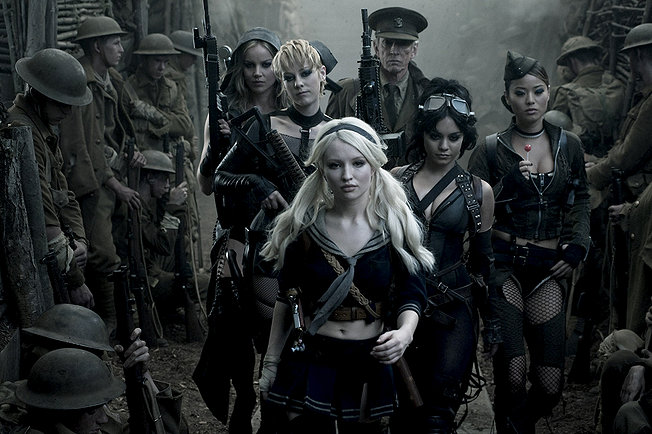Sucker Punch
 Co-written and Directed by: Zack Snyder
Co-written and Directed by: Zack Snyder
Starring: Emily Browning, Abbie Cornish, Jena Malone, Vanessa Hudgens, Jamie Chung, Carla Gugino, Oscar Isaac, Scott Glenn
Rated: PG-13 for thematic material involving sexuality, violence and combat sequences, and for language.
“Sucker Punch” is a film that’s dividing audiences left and right. Is it a moronic piece of cotton-candy fluff? Or a statement about the dire state of women’s rights with regards to the mental health industry in America? I was reminded very strongly of “The Matrix” — both it and “Sucker Punch” are films that wrap up a bit of 101-level theory in a special-effects-and-pretty-people candy coating. Where “The Matrix” was all about existential philosophy (what is real? Which is better, ignorance or painful truth?), “Sucker Punch” can be interpreted in a number of ways, from the Hero’s Journey to feminist treatise.
Boiling down the story without giving a great deal away is almost impossible, but it takes place on three levels of reality: on one, Emily Browning plays a young woman locked up in a mental institution by her abusive step-father. On another, she plays a waif captured by a criminal and put to work in his bordello-slash-nightclub. On the third, she’s a warrior, guided by a nameless mentor (Scott Glenn) as she battles everything from giant samurai to zombie WWI German soldiers. How real any of the levels are is debatable and depends on how deep down the metaphor tunnel you want to go.
Writer-director Zack Snyder’s rich palette of color, visual mashup, and lush sound effects and music permeate the film. We’ve seen Snyder’s style developing in his earlier work — “300” and “Watchmen” in particular — but this is his first film based on a story he created himself, and it bodes well for his future achievement. Visually, it’s as stunning as you would expect. Sure, it’s pretty much all green screen and CGI stuff, but the effects have gotten so amazing that complaining it doesn’t look entirely real is like criticizing a beautiful oil painting for not being a photograph. Snyder is a gifted director in the medium of computer-enhanced film.
There are enough repeated symbols and visual metaphors in the film to make dissecting it a pleasure, and it’s packed with references and blendings of various familiar tropes. In that respect, it’s a lot like “Scott Pilgrim vs. The World” — one gets the feeling that it’s aimed squarely at a particular generation of cultural consumers, and if you don’t have the vocabulary the filmmakers are using, you probably won’t enjoy the film at all. That alone explains why so many critics don’t like it; if you didn’t grow up watching anime and the right set of sci-fi and fantasy action cartoons, a lot of what the director is doing will sail right past you.
One can argue that having such a limited audience is a flaw, that films should be universally enjoyable, but that hasn’t been the case for a long time. Every film has its audience, this is just one whose audience is a bit more slender than most. If you watched the trailers and felt exhilarated, if you loved “Scott Pilgrim” and enjoy not only watching epic action shots but dissecting their underlying themes, do not miss “Sucker Punch.” If, on the other hand, you hate Snyder’s style, haven’t seen many of the films promoted at ComicCon, or don’t like films that use a genre’s own tropes to critique it, stay away.